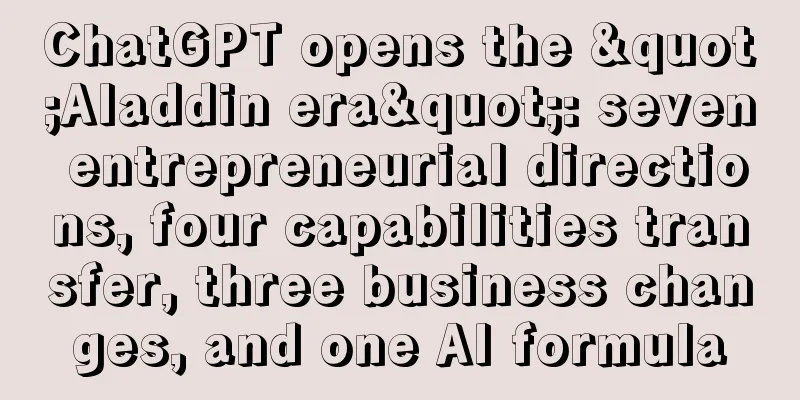ChatGPT opens the "Aladdin era": seven entrepreneurial directions, four capabilities transfer, three business changes, and one AI formula

I have always believed that one of the best ways to understand something is to write an article. As the owner of a brand consulting company, I am better than the average person at understanding a field in a short period of time. Today I want to share the results of the ChatGPT research of Jiangyi Consulting, and more importantly, share my research ideas. Table of contents:
Before researching, determine the right workflowWhen you want to research an unfamiliar field, it is more important to research your own research method first than researching the field. The following is the workflow of Jiangyi Consulting to research unfamiliar industries. We will use this method to study ChatGPT: Define requirements - Build a framework - Gather facts - Develop insights Defining requirements Most of the content written about ChatGPT on the market is a "reporting perspective" rather than a "useful perspective". The content of "reporting perspective" can be roughly divided into three categories:
A "useful perspective" means that the information you provide should have clear and specific inspiration for the client's business decisions, and help the client find their position at a huge turning point. Building the Framework In any field, there is a vast amount of content, and we cannot exhaust all knowledge. At the same time, we must understand that in any field, there is some key knowledge that is more important than other knowledge. Therefore, before conducting research, we must first build our own research framework to help us lock in the most critical information. Regarding ChatGPT, my research framework is as follows:
Gather the facts There is one most important principle in collecting facts - ensure the purity of the source of information. When faced with massive amounts of information, you don’t have time to read all of it. The easiest way is to see who wrote and said the information, and then decide whether to read it. I want to remind you that it is not that you should focus on the valuable information and just glance at the information of average value. Instead, you should not even look at the information of average value. Because other people's wrong perceptions will pollute your judgment. When facing a new field, you should try to absorb the most authoritative and professional opinions first, and don't be distracted by the noise in the media. When it comes to ChatGPT, reliable information sources may come from five places: The speeches by OpenAI founder Sam Altman and internal technical experts were the most valuable; Experts in the field of AI speak out, and their judgments about technology are more accurate; Judging from the judgment of business leaders in the technology circle, they will understand ChatGPT from both technical and business perspectives; From ChatGPT itself. We want to experience ChatGPT, get first-hand information, and use different questions, whether difficult or simple, abstract or specific, obscure or dangerous, to see what ChatGPT is capable of; Based on the summary of hard-core technology popular science KOLs, we can use them to carry out "technical literacy" and extract specific and key research clues from them. Providing insights What customers need is not information, but insights. Customers do not need us to organize information, but to understand information and help them digest it. Therefore, do not pile up data and information, but put forward your own understanding and prediction based on the information. The following are my insights: 1. Compared with previous AI, what is the advantage of ChatGPT? Three business changes triggered by ChatGPTTo understand the capabilities of ChatGPT, the best example is the story told by Cheetah CEO Fu Sheng: Fu Sheng adopted a dog named Sanwan. He asked ChatGPT why he gave the dog this name? ChatGPT's answer was: "There are many reasons why people name their pets, some to commemorate a loved one, and some to use a familiar object." Then, Fu Sheng gave a hint that the dog had been in a car accident and was sent to the hospital for surgery, and was adopted after the surgery. ChatGPT analyzed: "I guess the surgery was expensive, maybe 30,000 yuan, so you named it to commemorate the dog's surgery." ChatGPT guessed correctly. ChatGPT does not associate answers, but infers an answer. This is something that AI in the past could not achieve. Artificial intelligence is the simulation of human intelligence. Human intelligence can be roughly divided into several levels: Memory - Understanding - Reasoning - Imagination Previous AI helped humans store a large amount of knowledge and information, solving the memory problem. For example, search software such as Google and Baidu can only match information, but cannot understand it, let alone reasoning and imagination. As a "generative AI", ChatGPT is strong in that it can create new knowledge and is closer to humans in terms of intelligence. So what is the significance of this ability? I think the greatest significance is that it will turn "intelligence" into a kind of energy. 1. Intelligence will become a kind of "energy"Let’s first look back at a picture in the CITIC report: The difference between humans and animals is the degree to which they use tools. When people invented cars, our feet were freed; when they invented sewing machines, our hands were freed; when they invented mobile phones, our five senses were freed. When AI appeared, it was actually our brains that were freed. In the past, we once thought that artificial intelligence could only replace some blue-collar physical labor or basic mental labor. But now, artificial intelligence can completely replace some advanced mental labor, and eventually it can replace you and all future jobs. When AI becomes popular, intelligence will become a kind of energy. Just like we need to burn gasoline to start a car and electricity to run a factory, in the future, we will need "intelligence" to operate a business entity. At present, the computing power of ChatGPT consumes a lot of manpower and financial resources. Running an AI calculation is a consumption of social resources. However, it is conceivable that in the future, "intelligence" will become a rigid demand in our daily life and will become cheaper and cheaper, just like refueling a car and charging a mobile phone. When intelligence becomes a resource, our social structure and international landscape may face a reshuffle. We can look back and see that any release of human productivity not only promotes business development, but also subverts the international political landscape. For example, the emergence of the steam engine made Britain the world hegemon; the emergence of electricity made the United States the world hegemon; and after the emergence of computers, the machine revolution and digitalization brought about by them allowed China to lead the world. It is foreseeable that our use of AI is not only a business issue, but also a social issue and a political issue. 2. Entry-level entrepreneurial opportunities emerge againThroughout history, businesses that have become giants have often done so because they have occupied the user traffic entrance. For example, when the Internet was just starting out, portal websites occupied the traffic entrance to the web; later, companies like Google emerged, and a search box occupied the information entrance to the Internet; when smartphones appeared, APP became the entrance, so a large number of application companies emerged. Now many giants are working hard to make cars, because the future car, like the mobile phone, is also a user entrance. Therefore, whoever is at the top of the user chain will become the next giant. When AI like ChatGPT appears, it is conceivable that the user portal in the future should be an intelligent virtual person who can talk to you. We will use AI like a human to issue commands to all electronic devices around us. We no longer need to press buttons with our hands or confirm with our eyes. All operations will be handled by AI.
This is a very dangerous signal for some business giants who have already occupied the entry level. If Musk installed a very smart AI assistant in Tesla, when domestic car manufacturers do not have the AI research and development capabilities, you will not be able to access AI and become a downstream industry for others, and you will no longer wait for users to abandon you. In the past, the so-called entrance was more of a software, program, or a hardware device. In the future, the entrance may be an artificial intelligence model. With such a foreseeable business prospect, ChatGPT has corrected the entrepreneurial thinking of Silicon Valley and technology companies around the world. For example, the metaverse and web3.0, which were very popular in the past two years, now look more and more like a hype concept. For example, many AI companies in the past focused on using AI in very "practical" scenarios, such as face recognition, autonomous driving, etc. The emergence of ChatGPT made everyone realize that general artificial intelligence (AGI) is the foundation of all future businesses. When ChatGPT opens up a new business landscape, not only will new business giants emerge, it will completely overturn the current "decentralized" business trend of the Internet, and future business will return to "centralization." 3. Business returns to “centralization”For all platforms, whether it is traditional media like TV or today's TikTok and Xiaohongshu, there is an unchanging rule: content equals traffic. Whoever can produce large-scale content at a lower cost and higher efficiency will have greater traffic. The content production method has gone through the following processes: OGC——PGC——UGC——AIGC From OGC to UGC, from newspapers and television to today's WeChat, Tik Tok and Xiaohongshu, it can be clearly seen that the right to produce content is increasingly given to ordinary users, and traffic is naturally becoming more and more "decentralized." Especially with the introduction of blockchain technology and web3.0, everyone thought that in the future world, traffic sovereignty would be returned to every ordinary individual, but the emergence of ChatGPT broke this trend. The UGC business model requires the creativity of countless ordinary users. For the AIGC business model, a powerful AI is equivalent to hundreds of millions of ordinary users. The key to making AI powerful is not decentralization but centralization, because the key to AI evolution is "connection". As AI connects to more and more platforms, it will have more and more data. The more data, the smarter AI will be. As it connects to more and more APIs, AI will have more powerful capabilities and can do more things. Ultimately, AI will become a super brain. In today's era, the AI company that can build such a super brain must be a technology giant, not a startup. The reason lies in the operating principle of ChatGPT. 2. The principles and entrepreneurial directions of ChatGPT: one formula and seven entrepreneurial directionsWe are amazed at the intelligence level of ChatGPT, but what’s interesting is that OpenAI itself did not invent new technologies. Most of the technologies they use are open source. The most critical technology comes from a paper jointly published by eight Google engineers in 2017. This paper describes a deep learning model called Transformer, which is the "T" in GPT. Without going into details, let me simply say that the technical principle of the Transformer model is a "probability game". For example, if I say "I love you", the model will guess that the third word is most likely "you". Since it is a probability game, the most fundamental way to increase the probability is to increase the number of tests. The reason why "I love you" is the easiest to associate is that in daily life, we hear and see the word "you" followed by "I love" the most. Therefore, the success of ChatGPT is the result of using massive amounts of data to domesticate a successful artificial intelligence. ChatGPT's victory is the result of quantitative change to qualitative change. When they trained GPT-1, they used 7,000 unpublished books and the number of data parameters was 117 million, but for GPT-3, they selected 570GB from 45TB of data for training, and the number of parameters reached 175 billion. This process also uses the Transformer algorithm model, which simulates human knowledge storage, processing, understanding, and reasoning. However, there is no special technology involved. It is just that the algorithm is supplemented with sufficient training data, and ChatGPT can talk to you like a real person. Another important reason why OpenAI can process such a large amount of data is that Microsoft provides it with at least 10,000 Nvidia chips at a cost of more than $1 billion. In the face of ChatGPT’s success, we can summarize an AI evolution formula: AI = algorithm × computing power × data The algorithm is similar to the large language model used by ChatGPT. If AI is compared to a person, it is equivalent to the way humans think. Computing power is the ability to process large amounts of data. Behind it is whether there are enough chips. To put it bluntly, it means whether you have enough funds and deep scientific research support. Computing power is equivalent to human energy and physical strength. Data is also important. Data is equivalent to how many lessons humans have taken and how much experience they have gained. The more complete and abundant the data is, the smarter the AI will be. After we came up with this formula, we also understood the limitations of ChatGPT. Algorithms, computing power, and data are both the driving force of AI and its limitations. Algorithms correspond to the scientific research strength of a country or a company, computing power corresponds more to the funds you can mobilize, and data corresponds to how much user assets you can call. In addition, AI also faces a huge commercial obstacle, which is the level of social governance. Although the evolution of AI is leapfrogging, the iteration of human institutions and culture is slow. As the founder of OpenAI said, the evolution of AI should be rapid learning and cautious iteration. This means that AI can develop rapidly in technology, but when it is applied to human life, it should be slow and cautious, and the development of AI cannot be bound by the power of business and capital. Therefore, we can improve the previous formula again: From this formula, we can deduce that entrepreneurship in the ChatGPT field can be roughly divided into seven directions:
The first is the entrepreneurship of the basic model, which is the lowest level architecture of general artificial intelligence. In principle, this basic model can simulate all human intelligent scenarios. However, the basic model has extremely high requirements for algorithms, computing power, and data. The basic model is the crown in the field of artificial intelligence, but there are actually few companies that are qualified to ascend the throne. Among the domestic Internet giants, Baidu's Wenxin Yiyan theoretically has a greater chance, while other Internet giants are biased in one of the following aspects: algorithms, computing power, and data. For example, Alibaba does not have enough corpus data, and Tencent does not have enough algorithm technology. Relatively speaking, the vertical model may have more opportunities for ordinary companies. The vertical model is a form between the basic model and the application. When the basic model solves most of the intelligent scenarios of human beings, in some vertical subdivided fields, the evolution of AI depends on the correction of specific algorithms and the "feeding" of professional data. Therefore, in the future, there will be many companies that develop vertical models based on basic models. However, the underlying technologies they use are still provided by companies like OpenAI. For example, basic models dedicated to the medical industry and basic models for the travel industry. There are also some entrepreneurial directions that serve these companies by building models. For example, for computing power, we may need the support of a large number of scientific research laboratories and chip manufacturing industries. We all say that data is the "oil" of the AI era. In fact, a lot of professional data is controlled by professional companies. For AI, the future data trading will be like refueling a car, and there will be many companies reselling data. The so-called specific application startup is actually to build a bridge between the model and specific needs. For example, to address human loneliness, we can use ChatGPT to make an emotional chatbot. This bridge may be an APP on a mobile phone or a headset. Finally, let’s talk about social governance-oriented entrepreneurship, which may be overlooked by many people. The rise of AI will inevitably turn many people in the world into the “useless class”. Many people have learned and honed social skills for many years, but they will become worthless in the face of AI. So where will these people go in the future? How will they build new professional skills and find new survival value? This still requires some companies to provide corresponding training education and solutions. Secondly, AI is a tool more terrifying than an atomic bomb, and the safety of AI will be as important as its application. The safety of AI involves international conventions, national laws, AI ethics, and technical treaties, but these are all constraints on AI from an "institutional" perspective. I think that the ultimate way to constrain technology is to rely on technology itself. Just like we cannot rely solely on legal sanctions to eliminate computer viruses, what we really need is anti-virus software. How to use technology itself to constrain technology? This is really worth exploring. Using technical means to achieve AI supervision is also a huge entrepreneurial opportunity. 3. ChatGPT’s Future Capabilities Prediction: Four “Transfers” of AI ApplicationsThe capabilities of ChatGPT that we see now are more reflected in creativity. In various research reports, more business prospects are mentioned that ChatGPT's content generation capabilities, which are often referred to as AIGC. But in my opinion, we are only at the second stage of AI evolution. I predict that the impact of artificial intelligence on humans will have four historical stages, namely: Transfer labor - transfer brainpower - transfer decision-making - transfer significance We can regard the electronic mechanical devices invented by humans in the past as "low-intelligence versions of AI". Mechanical equipment can only help us do basic physical work. When AI like ChatGPT appears, it can already solve basic mental work. After we hand over the work of our brain and body to AI, the next step is our self-awareness. What we should hand over to AI soon is our decision-making power. These decision-making powers may include: What is the next entrepreneurial direction? What is the reasonable organizational structure of the company? How should we promote ourselves? Giving away labor and physical strength is basically using AI to improve production efficiency and reduce production costs. However, in future business competition, the core issue that AI will solve may not be cost and efficiency issues. The key to winning over your competitors lies in the degree of your intelligence development. If we define AI as a tool for ceding decision-making power, you can launch an AI version of a "digital partner." The "digital partner" can digest all the business data of the enterprise, a large amount of business practical experience and the knowledge system you want it to master. You can discuss the company's strategic direction, organizational structure, and business model with it every day. In other words, AI is not working with you, but conspiring with you. For example, in the field of scientific research, in the future, we will not assign a task to AI to carry out a certain research direction and topic, but we will input our thoughts and needs, and AI will determine what the research direction and topic is. AI itself is a scientist and has the ability to think independently. In life, we also constantly give up our decision-making power. For example, on a dating website, it may be AI that suggests which person you choose to marry. When AI absorbs enough data, its conclusion may be more reliable than you who are blinded by love. When AI makes more and more decisions for you, then I would like to ask: Is your life controlled by yourself or by AI? When AI becomes so powerful, humans will question the meaning of their existence. Helping humans find the meaning of life is an entrepreneurial direction with great potential. But the irony is that AI has eliminated the meaning of life, and we use AI to help ourselves find meaning. 4. How do ordinary people welcome the AI era? Three major driving forces of the "Aladdin era"After New York public schools strictly prohibited students from using ChatGPT to write papers, Ethan Mollick, a professor at the Wharton School of Business, began to encourage his students to use ChatGPT to write papers. Imagine if all students can use ChatGPT to write papers, will there be a significant difference in their scores? Of course there will be a difference. Although the average score will increase, some people will get an A and some will get a C, because different people have different abilities to use ChatGPT. This principle is equivalent to you and your grandma using Baidu to search for the same thing. The results you find will definitely be more accurate and reliable than your grandma's. As Michael Taylor, founder of UK marketing firm Ladder, puts it: “When you can create anything you want, your ability to express exactly what that is becomes important.” I think the difference between people in the future will be our ability to creatively use AI. I can use an analogy to describe this ability: One day, three people got Aladdin's magic lamp. Aladdin's magic lamp told them: "I can grant each of you one wish." A said, "I want a fortune of 10 billion." So he became a billionaire. B said: "I hope you can fulfill my 100 more wishes." As a result, he gained the ability to awaken divine power countless times. C said, "I want to have the same magical power as you." So he himself became the god Allah. AI is like Aladdin's magic lamp. You can use AI to meet most of your needs. But how to maximize the capabilities of AI does not depend on the capabilities of AI, but on our ability to use AI. I call this era the "Aladdin era." The capabilities we use AI can be divided into three dimensions:
1. AI’s access rightsAccess to AI will be an important indicator of the future class gap. The earliest class divisions were determined by bloodline. For example, in ancient India, caste determined human rights and status, and Brahmins were born nobles. Later, knowledge also became a factor in class division. What university you went to and your academic qualifications determined your future prospects in a certain sense. In the future, class will be determined by access to AI. Your opportunity to access, use, and develop AI will determine how much resources you can obtain and how much wealth you can create. If AI is Aladdin's magic lamp, what you get will be very different if you make one wish a year or 365 wishes a year. 2. Your professionalismSuppose you use ChatGPT with an architect to design a house. The design plan that the architect gets from ChatGPT must be more professional than yours. Figure | Indian architect Manas Bhatia uses ChatGPT and Midjourney to design a future city on Mars Many people think that with the advent of the AI era, people will become more "retarded" because AI can solve many mental problems for you. But in fact, AI will make some people more professional and more aggressive. Because the more professional you are, the stronger your ability to mobilize AI will be. At the same time, AI will also empower you more, and a two-way evolutionary relationship will be formed between you and AI. Therefore, experts in the era of artificial intelligence will be more valuable than today's experts. 3. Your imaginationWe mentioned before that the right to access AI is the human right of the future, which will determine the class gap between you and others. Because AI calculations consume computing power, computing power is simply "money". Large companies, large conglomerates, and wealthy people with computing power will have more access to AI than ordinary people, which will lead to a greater class gap and polarization between the rich and the poor. But fortunately, the number of AI visits and the value you extract from AI are not completely positively correlated. Let's assume a scenario: a father plans to use AI to teach his children history. The first option is that he describes the history he wants to teach his children as a simple requirement and asks AI to compile it into an audio book. The second option is to let ChatGPT collect information about historical figures and then write a voice chat software to let AI pretend to be a historical figure to interact with the child. Obviously, the creativity of the second solution is better than that of the first solution. Moreover, this is a real case. Swedish company Facing It has developed an AI software called Hello History, which allows ChatGPT to transform into historical figures to interact with you. Here, you can chat with Aristotle and become soulmates with Marie Curie. The real-time interaction gives people a sense of "being there", and it will be easier for you to fall in love with history. The right to access AI represents fairness, your expertise represents effort, and your imagination represents ability. It seems that there is no essential difference between the society in the AI era and the society now. The future society will still have injustice and will still require extra effort, but imagination has never been as important as it is in the AI era, and it determines the fate of countless ordinary people. V. ConclusionFinally, I would like to repeat this sentence again: Human beings are about to enter the "Aladdin era", and our ability to creatively utilize AI will determine the gap between people. Author: General Liang Source: WeChat public account "General Liang (ID:liangjiangjunisme)" |
<<: Dong Jie made "slow live broadcast" popular
>>: Douyin group buying: huge traffic "troubles" offline merchants
Recommend
Can Amazon Germany ship without VAT? Detailed answer
If you want to open a store and sell things on Ama...
Hema no longer wants to be the Chinese version of Sam's Club
In recent years, Hema has been continuously explor...
How does Amazon calculate conversion rate? What is a normal conversion rate?
For Amazon merchants, it is important to pay atten...
How to change the language on Amazon France? How to switch to Chinese?
Amazon backend supports multiple languages. For ex...
Is it reliable to transfer a Shopee store? Is it safe?
If the online store is not doing well, some mercha...
Is it difficult to get an eBay business store? What are the models?
If you want to join eBay, you can join through two...
How long will Tianshui Malatang remain popular?
I believe everyone has eaten Malatang. Recently, T...
Douyin sells fresh food, relying on Pinduoduo to cross the river
After bidding farewell to the absolute low-price s...
4 recent favorite cases
In this era of information explosion, how can bran...
100 Keyword Predictions for 2023 | Health (81-90): Gua Sha, Meta-Mindfulness, and “Rest” Exercises
WPP's brand Wunderman Intelligence released it...
TikTok's survival story
The US e-commerce business has just been successfu...
Can you learn in-depth content on Xiaohongshu? Comparison of Douban, Xiaohongshu and Bilibili
In everyone's mind, different products have di...
Review interviews and salary negotiations, you will definitely need it
Introduction: This article is an interview and job...
What is the difference between Shopee local stores and cross-border stores?
Shopee has both local stores and cross-border stor...
What was Amazon’s Singles’ Day sales volume in 2020? How to increase sales?
Now, in addition to Taobao, Tmall, JD.com, and Pin...









